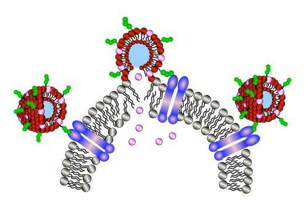 Chemical biology involves the exploration of chemical principles for the study and manipulation of biological systems, as well as the harnessing of biology to advance chemistry. It integrates tools and techniques from different scientific fields to foster the innovations and discoveries at the interface of chemistry, biology, and medicine. The Department of Chemistry and Biochemistry at the University of Maryland possesses unique strengths in chemical biology.
Chemical biology involves the exploration of chemical principles for the study and manipulation of biological systems, as well as the harnessing of biology to advance chemistry. It integrates tools and techniques from different scientific fields to foster the innovations and discoveries at the interface of chemistry, biology, and medicine. The Department of Chemistry and Biochemistry at the University of Maryland possesses unique strengths in chemical biology.
The research of our faculty focuses on a wide variety of important areas at the chemistry-biology interface. These include: self-assembly and host-guest systems for molecular recognition; design and synthesis of novel molecular probes for deciphering biological functions; development of special analytical tools for investigating enzymatic reactions; innovative approaches to studying ubiquitination, glycosylation, and other posttranslational modifications; site-specific modification of therapeutic antibodies; structural biology and biophysical chemistry of biopolymers and their complexes; advanced computational models of complex biological systems; functional proteomics and glycomics; and
nanotechnology/nanomaterials for drug delivery and vaccine development. These diverse research activities involve exciting interplays of chemistry, biology, materials science, and medicine. In addition, the chemical biology research in the department is also integrated with other departments and nearby institutions including Department of Cell Biology and Molecular Genetics, Department of Bioengineering, University of Maryland School of Medicine, the National Institutes of Health, the National Institute of Standards and Technology, and the U.S. Food and Drug Administration. This highly integrated program provides a unique platform for training, education, and research collaborations at the chemistry-biology interface.
















